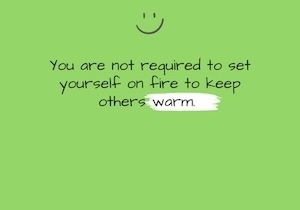There’s a moment where you catch yourself loading the dishwasher “just so,” while quietly seething that no one else does it “right.”
Or maybe you’re in the middle of planning a birthday party, buying a gift, throwing in a load of laundry, and wondering… why is it always me?
Somewhere along the way, many of us got really good at being reliable. We are the helpers, the doers, the fixers.
We remember the appointments, prep the meals, sign the permission slips, keep the peace, fill in the gaps, and buy the toilet paper.
And we don’t just do it—we do it well. Quietly. Thoughtfully. Consistently.
Initially, it begins as a gesture of love or care.
Then it becomes a habit.
Then an expectation.
We become “Johnny-on-the-spot” or maybe “Joann Reliable” (because let’s be honest, it’s often Joann), and it can start to feel like a life sentence.
Women, in particular, are socialized to be the caregivers, the peacemakers, the ones who hold it all together.
And yes, this does affect men too, but research consistently shows women disproportionately shoulder the “emotional labor” of life.
We grow up absorbing invisible expectations:
- Be helpful
- Be polite
- Don’t make waves
- Anticipate needs—before anyone has to ask
And then, we carry this programming into adulthood. Into our marriages. Our parenting. Our friendships… and even our professional lives.
Why? Because we’ve been conditioned to play this role.
We want to be helpful. We like being capable. But before we know it, we’ve trained the people around us to let us handle it—because we always do.
And then something subtle happens. Asking for help starts to feel like an imposition. Or worse, like a weakness.
Maybe your partner says, “You do it better…”
Or your teenager insists, “I don’t know how to do it like you…”
Or your boss presumes, “That’s what I pay you for…”
And inside, you’re screaming: But I don’t want to be the only one who knows how. This is how perfectionism and people-pleasing creep in.
It stems from a desire to be good, useful, or appreciated. However, over time, that desire can become entangled with resentment. And underneath that resentment is grief, for all the times we abandoned ourselves to be reliable for everyone else.
So, how do we change this?
We start small.
We interrupt the urge to do it “the right way,” if that means doing it all ourselves.
We ask for help—even when it feels clunky or awkward.
We let people fumble.
We let go of doing it perfectly.
And perhaps most of all, we remember that being loved and being needed are not the same thing.
If this sounds like you, and you’re looking for help breaking the cycle of people-pleasing and perfectionism, let’s talk. Hit reply to this email or book a call with me to discuss how coaching can help you break this cycle.
Just because you have been a lifetime people pleaser, does not mean you have to be for the rest of your life. We are always allowed to change the narrative. It’s never too late.
Wishing you a great day!
–Jackie





